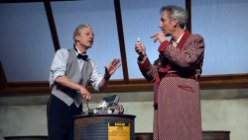How far would you go to avoid conflict? How much would you compromise yourself to avoid someone thinking ill of you? That’s the conundrum faced by Mr. Biedermann, the upright, prosperous businessman protagonist of Swiss writer Max Frisch’s 1958 play The Arsonists (or Biedermann und die Brandstifter in the original German), now playing Berkeley’s Aurora Theatre in a new translation by Alistair Beaton.
In a city beset by a plague of arsonists and the omnipresent firefighters who keep watch against them, Biedermann has every reason to be suspicious when a homeless wrestler shows up on his doorstep, inviting himself in for food and shelter by flattering Biedermann’s imagined (or rather assigned) generosity. Michael Ray Wisely’s hilarious, elaborately mustachioed Schmitz has a marvelously canny manner of making people feel terrible for suspecting him or trying to get rid of him by telling them they’re not like the others in town who’d turn a guy like him out on his ear. And sure enough, Dan Hiatt’s bourgeois pillar of polite society soon becomes pricelessly desperate to please, twisting himself and his household into knots to appease his unwanted guest.

Much to the dismay of Mrs. Biedermann (a refined and perplexed Gwen Loeb) and their maid Anna (Dina Percia, fuming and incredulous), soon there are two house guests holed up in the attic, as Schmitz’s buddy Billy joins him (Tim Kniffin, with elegant charm barely concealing contempt), a smooth-talking ex-waiter still dressed in the tux of his former job. (The class-conscious costumes are by Christine Crook.) The more it looks like these obvious con men are very likely the dreaded arsonists as well, the more Biedermann bends over backwards to convince them and himself that such suspicions are the farthest thing from his mind.
Director Mark Jackson’s staging of the play is stunning, superbly balancing the dark comedy of the events inside the house with the highly stylized element of a full-on Greek chorus in the form of the Firefighters (Tristan Cunningham, Michael Uy Kelly, and Kevin Clarke), offering portentous, woe-stricken commentary in unison, but powerless to affect the terrible decisions being made around them.



